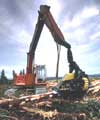

Home Page

| Trees, | Timber, | and Trade | Fall/ Winter 2001/2002 | |
 |
 |
Home Page |
 |
| Prerequisites: We expect that students will have reasonable
facility working with numerical data and that they can clearly express
themselves in an well-organized essay.
Description: This two-quarter program is designed to introduce students to the interrelationships between the ecology and economy of specific locations with the global market and environmental issues. The forest ecosystems of the Pacific Northwest have provided numerous products and services to both local and global societies—fresh water, oxygen, salmon, timber, rich soils, recreation, wildlife. We will examine the ecology of these ecosystems—both economic and biologic—to understand the complex interactions we have with our surroundings. By examining the products and services forests provide and how we value and use these services, students will gain an appreciation of how humans and societies shape the ecology of specific locales. We will study forest ecology of the Pacific Northwest, learn to identify many of the trees and plants, look at how we manipulate these ecosystems, and examine the underlying physiological processes that allow trees and forests to work. Fall quarter, we’ll start with learning the various trees of the forests and begin our study of forest ecology. We plan to spend quite a bit of time in the field during the fall, exploring the various forests of our region and developing an understanding of them on both a scientific and aesthetic level. Students will learn basic field ecology techniques and apply them to different ecosystems. Winter quarter, we will continue our studies of forest ecology, moving into some of the theoretical aspects and how they are used to develop management decisions. We will move indoors in lab and explore various aspects of tree physiology and structure. The environmental policy side will look at the economic and political forces affecting the exploitation of forests, as well as the potential for alternatives. In the fall quarter we will survey economic theories that explain how the profit motive governs resource use and influences the quality of the environment. We will consider the arguments made by economists for "efficient" resource policy along with the counter arguments of their ecological critics. We will also take an initial look at the growth of the environmental movement in the US and other countries. Winter quarter, our focus will shift to specific policy issues, such as wilderness and natural habitat preservation, global climate change, and the inclusion of timber in international trade agreements. Our perspective will be local and global: how forest policy affects local communities and how it is embedded in the political economy of globalization. Students will plan and complete an independent library research project during winter quarter, focusing on an issue of particular interest. By working in teams, they will be able to combine the many sides of environmental analysis: laboratory and field science, social causes and consequences of environmental policy, and strategies for effective social change. Credit Equivalents: forest ecology, field botany, introductory
economics, ecological economics, and statistics
Field trip Fee: $100 for extended field trip
|
| Faculty Name | Phone | Location | |
| Paul Przybylowicz | 360 867-6476 | przybylo@evergreen.edu | Lab II, room 3271 |
| Peter Dorman | 360 867-6899 | dormanp@evergreen.edu | Lab I, room 3015 |
|
|
|
Seminar Papers |
|
|
|
| Return to
Evergreen Academic Programs Home Page The Evergreen State College Home Page |
Return to Top |